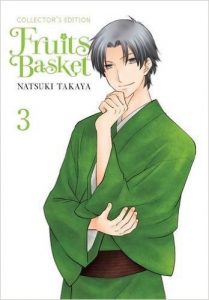By Natsuki Takaya. Released in Japan by Hakusensha, serialized in the magazine Hana to Yume. Released in North America by Yen Press.
The benefit of re-reading a series with so much going on like Fruits Basket is that things you hadn’t noticed before turn out to be signposted, whereas things that once held your attention don’t appear to be as relevant in the long run. We only get one new Sohma this time around, as we meet shy, bullied Kisa trying to escape from serious bullying at school and a somewhat hysterical mother at home. I remember being impressed at the time with the fact that Takaya had the characters take exception to the standard Japanese response for bullying, which is “if you were strong enough, they wouldn’t bully you”. Of course, this is sort of what happens – the newfound bonds with Tohru and, to a lesser degree Yuki, allow Kisa to find inner strength and return to school. So the message is a bit undercut, but it’s still a very good arc, I think.
Speaking of Yuki, he talks about his own past and that he once turned in on himself the way Kisa did, but the details are sketchy – no doubt to be saved up for later. Certainly he once again contrasts with Kyo – the head of the family, Akito, seems to have smothered Yuki a bit, whereas the opposite is true of Kyo. There’s also the love triangle, which at this point Takaya is still trying to keep as balanced as possible, but knowing the outcome as I do, it’s difficult not to see that she had Kyo and Tohru in mind as the endpoint even at this stage. And while most of the latter part of this omnibus deals with Kyo’s family issues, as he and his sensei Kazuma try to show affection while still somewhat not understanding the other person, it’s very clear that Tohru is why Kazuma showed up in the first place.
This will be deconstructed later in the series, but at this point it’s astonishing how straight it’s played that everything can be healed with the power of Tohru’s all-loving presence. Shigure is betting everything on Tohru being what finally breaks the curse. Kazuma arrives as he’s heard about Tohru and wants to make sure that she’s not going to run away if she sees the actual true form of what Kyo’s curse is. And her immediate “I love you!” to Kisa, even if it’s more in a “so cute!” way, is what starts her on the road to healing. In retrospect, of course, this really is setting us up for a fall – the arrival of Hiro next time around will help, but right now Tohru is being portrayed as a saintly goddess as that’s how most of the main characters are viewing her.
As with previous volumes, this is a good adaptation of the Japanese omnibuses. The interstitials are gone, replaced with simple SD-art, but it was like that in the Japanese reprint as well. and there’s nice color pages at the start. And the translation is smoother but also looser than the original Tokyopop one. Anyone wishing to upgrade should be quite happy.
